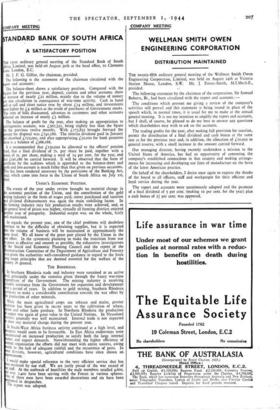OMPANY MEETING
TANDARD BANK OF SOUTH AFRICA
A SATISFACTORY POSITION
HE 131st ordinary general meeting of the Standard Bank of South no, Limited, was held on August 30th at the head office, to Clements ane, London, E.C.
Mr. J. F. G. Gilliat, the chairman, presided.
The following is the statement of the chairman circulated with the eport and accounts: The balance-sheet shows a satisfactory position. Compared with the gures for the previous year, deposit, current and other accounts show increase of nearly £2i million, mainly due to the volume of money ,t into circulation in consequence of war-time activity. Cash in hand d at call and short notice rose by about £14 million, and investments ere higher by £4 million as the result of purchases of Government stocks.
e item of bills discounted, advances to customers and other accounts eflected an increase of nearly £3 million.
The balance of profit for the year, after making an appropriation to ontingencies account, was £567,351, being slightly less than the figure or the previous twelve months. With £173,835 brought forward the mount for disposal was £741,186. The interim dividend paid in January I absorbed £125,000, and after appropriating £50,000 for bank premises ere is a balance of £566,186.
It is recommended that £150,000 be allocated to the officers' pension nd, that a final dividend of 7s. per share be paid, together with a nus of 2s. per share, making a total of 14 per cent. for the year, and at £191,186 be carried forward. It will be observed that the form of ertificate by the auditors which is appended to the balance-sheet and rofit and loss account is much fuller than that given on previous occasions.
s has been rendered necessary by the provisions of the Banking Act, 942, which came into force in the Union of South Africa on July 1st, 943.
UNION'S ECONOMIC POSITION.
The events of the year under review brought no material change in e economic position of the Union, and the contribution of the gold fining industry in the form of wages paid, stores purchased and taxation nd dividend disbursements was again the main stabilising factor. In e farming industry very fair production results were achieved, and, as general level of prices was higher, virtually all farming districts enjoyed other year of prosperity. Industrial output was, on the whole, fairly ell maintained.
As regards the present year, one of the chief problems will doubtless ntinue to be the difficulty of obtaining supplies, but it is expected t the volume of business will be maintained at approximately the e level. We all know of the great part played by the Union in the ar effort. In the systematic planning to make the transition from war peace as effective and smooth as possible, the exhaustive investigations the Social and Economic Planning Council and the report of the construction Committee of the Department of Agriculture and Forestry ve given the authorities well-considered guidance in regard to the basic g range principles that are deemed essential for the welfare of the ountry in general.
THE RHODESIAS.
In Southern Rhodesia trade and industry were sustained at an active el, principally under the stimulus given through the Leavy war-time ,penditure of the Government. The mining industry is receiving dluab!e assistance from the Government for expansion and development era period of years. In addition to gold mining, Southern Rhodesia ontinues to make a considerable contribution towards the war effort by e production of other minerals.
While the main agricultural crops are tobacco and maize, greater tention has been given in recent years to the cultivation of wheat, ton and other farm produce. In Northern Rhodesia the production copper was again of great value to the United Nations. In Nyasaland usIness generally was well maintained. Internal trade is not expected show any material change during the present year.
In South-West Africa business activity continued at a high level, and Teets would seem to be favourable. In East Africa endeavours were centrated on increased production to satisfy both the large internal et and export demands. Notwithstanding the higher efficiency of Temal organisation the efforts did not meet with entire success, owing airtlY to the lack of adequate rainfall and the recurrence of pests. In e districts, however, agricultural conditions have since shown an provement.
I Would make special reference to the very efficient service that has n rendered by our staff. We are justly proud of the war record of staff. At the outbreak of hostilities the male members totalled 4,600, over 1,400 have been serving with the Forces in various spheres. se of these men have been awarded decorations and six have been cloned in despatches.
e report was adopted.


























 Previous page
Previous page